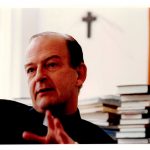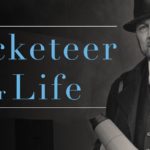Randy Boyagoda’s fine biography of Fr. Richard John Neuhaus could not have come at a more opportune time. In the past eight years, the Obama administration and various elites have shown unparalleled hostility to those who would seek to live out their faith in the public square. Despite numerous Supreme Court decisions upholding First Amendment rights, the hostility shows no signs of abating. Boyagoda’s account of Neuhaus’s life gives us an opportunity to consider the life of America’s greatest advocate for those rights and the lessons Neuhaus offers us today.
Richard John Neuhaus was born the son of a Lutheran pastor in Canada’s Ottawa River Valley. From an early age, he showed the two character traits that would propel him in life: great hope in God and enormous self-confidence.
Self-Confident from the Start
The latter trait developed before the former. Over the course of his life, Neuhaus would establish and edit many publications. This began, Boyagoda writes, with News of Miller Street, when Neuhaus was only nine: “It was full of his musings, of local gossip that he picked up, and, more scandalously, included select excerpts from his big sister Mim’s diary, which he’d found after she left home for Nebraska.” Neuhaus later noted that for Pembroke, Ontario, the publication was first-rate, and offered a revealing self-assessment: “From early on . . . I assumed people would be, or should be, interested in what I had to say.”
Start your day with Public Discourse
Sign up and get our daily essays sent straight to your inbox.That confidence never abated. Years later, George W. Bush recalled that Fr. Neuhaus was easy to talk to because “he never seemed intimidated.” This was not always a good thing. As Boyagoda summarizes, “Throughout his boyhood, Neuhaus’ personal experiences were consistently exceptional, if not always positively so.” His early teachers declared him ineducable, and “beer parties and panty raids,” as he referred to them, got him into trouble in high school. But he got his act together eventually: after bluffing his way into college—he told an administrator he hoped the school would receive his high school diploma “soon”—and completing seminary, he served as a Lutheran pastor at the parish of St. John the Evangelist in Brooklyn.
Neuhaus thrived in city ministry, as did his congregation. The greatest adventure, as he saw it, was to live among the urban poor and to serve as their pastor and advocate. Soon, Neuhaus came to see that his advocacy should expand beyond Brooklyn, and he became involved in the Civil Rights Movement. He and his predominantly black congregation bused down for the March on Washington. His congregation heard his stirring “I Have a Dream” speech—but not Neuhaus. The story (not recounted by Boyagoda) goes that a fellow pastor assured Neuhaus that King would not speak for hours, so the two of them headed to a bar, unaware that they were missing history as they enjoyed their drinks.
Neuhaus would become an even more significant figure in the antiwar movement, helping to found Clergy and Laity Concerned about Vietnam. He soon found himself as one of the leading clergymen of the American Left, surrounded by the right people who thought the right things. The great Protestant theologian Reinhold Niebuhr reportedly shook his hand and said, with satisfaction, “I’m told you’re the next Reinhold Niebuhr.”
Twenty years later, Neuhaus was America’s most prominent conservative Catholic. What made the man of such brimming confidence change his mind? As he saw it, and as Boyagoda tells it, it was more a matter of holding to core principles while others around him changed. Neuhaus tried to maintain a place for himself on the Left and in the Lutheran Church, but when he could no longer do so in good conscience, he left them both.
A Break with the Left
His break with the left took place around three points. First, in Neuhaus’s mind, “the Movement” existed to defend and empower the weak and the marginalized. After de-segregation and withdrawal from Vietnam, his focus shifted to battles over abortion. Who was more weak and defenseless than the unborn child? He soon discovered that the Left was frequently more interested in furthering private rights and protecting class privileges than taking responsibility for others. In “The Loneliness of the Long-Distance Radical” for the Christian Century, Neuhaus declared the Movement “dead,” Boyagoda writes,
because the majority of its members had abandoned its higher ethical aspirations—to bring peace and justice to the poor and war-trodden at home and abroad—for the intoxications of personal liberation-cum-libertinism. . . . Indeed, [Neuhaus] wondered . . . what were those to do who remained committed to reaching “the Kingdom of God” rather than being now committed to achieving “the perfect orgasm”?
Conversations with liberal elites would only drive this home. One in particular stood out for Neuhaus. A prominent doctor assured him that no one should be born who was not guaranteed “the minimal requirements for a decent existence.” Neuhaus reflected: “When I pointed out that, by his criteria, most of the people I work with in Brooklyn should have been aborted in the womb, he responded with utmost sincerity, ‘But surely many, if not most, of the people who live in our horrible slums would, if they could be objective about it, agree with me that it would have been better for them not to have been born.’” Neuhaus thought his congregants had lives worthy of life.
Second, it became more obvious to Neuhaus that the Left held as a “distinctive dogma” that “evil is inherent in, and not accidental to, the American Way.” Once he shared a stage at an anti-Vietnam rally with Norman Thomas, a Presbyterian minister and repeated Socialist candidate for the presidency. Looking out at their fellow protesters burning the American flag, Thomas said, “Richard, don’t they understand that our purpose is not to burn the flag, but to cleanse the flag?”
Third, the Left became increasingly hostile to religion and to living out religious principles in society. When Carter ran for president, Neuhaus had high hopes that he would build a bridge between secular elites and religious masses. Later, as these hopes failed, Neuhaus’s attempts to “cleanse the flag” and build a bridge between religion and politics migrated rightward. There he found presidents interested in listening to religious voices, none more so than George W. Bush. Bush wanted help craft “policy and ideas” based on “strong theology and moral conviction,” he told Boyagoda. It was Neuhaus who coined the phrase that members of the Bush administration would repeat as their goal: “Every unborn child protected in law and welcomed in life.”
First and Foremost, A Man of God
Boyagoda sums up Neuhaus’s project as having two parts. The first part was made explicit in his speeches and writing: “the political, social, and cultural institutions of American public life should be open to religiously informed positions (and persons).” The second part was implicit, demonstrated by Neuhaus’s unflagging self-confidence: “that Neuhaus himself could offer, in his own positions and person, the very best in religiously informed contributions to American public life.”
This two-part observation illustrates the kind of biographer that Boyagoda is: occasionally critical, always judicious, insightful, clever, and entertaining. Of course, the book is not without faults. Here and there, minor errors crop up—the sequence of events or the title of a former employee—and Neuhaus’s kindness and pastoral side are not always as visible as they might be.
Errors aside, Boyagoda captures who his subject was and how he thought. First and foremost, at the core of his being, Richard John Neuhaus was a priest. He entered into public life, Boyagoda writes, “as a man of God who found in that office and vocation both the means and the imperative that ordered his considerable ambitions and energies into protest-framed activism, controversy-making, and coalition-building.” Living out that vocation was the most important thing he did, and he made it clear to those he taught that the same was true for them. They were to understand what they did as a kind of ministry, whether it be writing, political organizing, or taking care of their children.
Neuhaus was a father in another sense, too: that of creating intellectual families. From the time he was a Brooklyn pastor in 1961, Boyagoda recounts, Neuhaus was a master of “intellectual socializing and social intellectualizing.” He persuaded likeminded people across religious, intellectual, political, and cultural contexts to gather. Once assembled, they would have “projects and meetings that reliably led to more projects and meetings and also forged strategic alliances and rich personal friendships and led to much late-night drink and talk—all of which Neuhaus focused, first and last, on questions of public and religious significance.” The noted scholar of John Paul II, Rocco Buttiglione, observed that this was something the late pope and Neuhaus had in common: “they were both centers of great communities of friends.”
Those who would follow in Neuhaus’s footsteps would do well to note these lessons of his life. Religion and vocation matter more deeply than political wrangling, and we must continue to build intellectual families that combine conviviality with fighting for the greatest causes. But Neuhaus was also a shining example of hope. For all his braggadocio and self-confidence, and through great difficulties, he remained more confident in the triumph of Christ that determines the final outcome of history. Giving an account of the authors who had influenced him, Neuhaus concluded with “Paul, above all Paul, always Paul.” He attributed the style of his own confidence to I Corinthians 4:5: “Judge nothing before the time, until the Lord come, who both will bring to light the hidden things of darkness, and will make manifest the counsels of the hearts.” For the bedrock of that confidence, he offered Romans 14:8: “whether we live, we live unto the Lord; and whether we die, we die unto the Lord: whether we live therefore, or die, we are the Lord’s.”
With his biography, Randy Boyagoda shows what that hope looked like in one remarkable life. In a time of increasing hostility to religious faith lived out, such hope is essential. In his final public lecture, three months before he died, Fr. Neuhaus offered one final assessment of how that hope-filled faith is lived out in public life:
We are not naïve, we are not utopians. We are people filled with hope, we Christian people. . . . [Because of our faith in Christ,] we are vindicated, we know how the story turns out. . . . For us, it is only this, that in our little moment—and all of us have but a little time—we are found faithful in living the truth . . . . No part of the Church has ever gotten it quite right, no, but we just have to keep on working at it, because that’s what it means to respond to the invitation to follow him.














